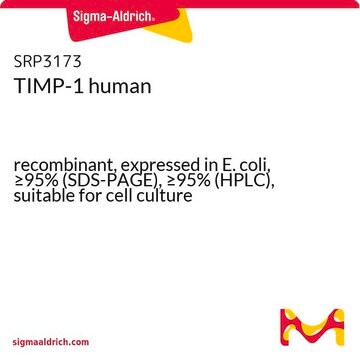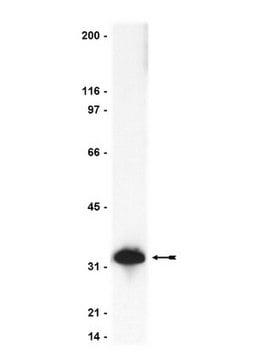SRP6445
TIMP1 human
recombinant, expressed in HEK 293 cells, ≥95% (SDS-PAGE)
Sinónimos:
CLGI, EPA, EPO, FLJ90373, HCI, TIMP, TIMP metallopeptidase inhibitor 1, TIMP-1
About This Item
Productos recomendados
biological source
human
recombinant
expressed in HEK 293 cells
tag
6-His tagged (C-terminus)
assay
≥95% (SDS-PAGE)
form
lyophilized
mol wt
calculated mol wt 24 kDa
observed mol wt 28-32 kDa by SDS-PAGE (DTT-reduced.)
packaging
pkg of 10 μg
impurities
<1 EU/μg endotoxin (LAL test)
UniProt accession no.
shipped in
wet ice
storage temp.
−20°C
Gene Information
human ... TIMP1(7076)
General description
Biochem/physiol Actions
Physical form
Reconstitution
Storage Class
11 - Combustible Solids
wgk_germany
WGK 3
flash_point_f
Not applicable
flash_point_c
Not applicable
Certificados de análisis (COA)
Busque Certificados de análisis (COA) introduciendo el número de lote del producto. Los números de lote se encuentran en la etiqueta del producto después de las palabras «Lot» o «Batch»
¿Ya tiene este producto?
Encuentre la documentación para los productos que ha comprado recientemente en la Biblioteca de documentos.
Nuestro equipo de científicos tiene experiencia en todas las áreas de investigación: Ciencias de la vida, Ciencia de los materiales, Síntesis química, Cromatografía, Analítica y muchas otras.
Póngase en contacto con el Servicio técnico






